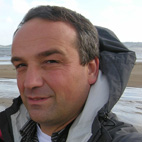International Complex Research Laboratory for Study of Climate Change, Land Use and Biodiversity
The Laboratory was established in 2012 with the help of a 4.2 mln euro grant from the German Federal Ministry of Education and Research with the aim of conducting research in the framework of the SASCHA “Sustainable Land Management and Adaptation Strategies to Climate Change for the Western Siberian Grain Belt” project (2011-2016).
Project Director
Professor
Biodiversity and Ecosystem Research Group
University of Muenster, Germany
Researchers:
.jpg)
Prof. Dr. Andrei Tolstikov, Assoc.Prof., Cand.Sci. (Entomology)
Research Supervisor
atolus@yahoo.com
.jpg)
Dr. Andrei Yurtaev, Assoc.Prof., Cand.Sci. (Physical Geography,
Biogeography, Soil Geography and Landscape Geochemistry)
Administrative Officer
yurtaevgeo@yandex.ru
.jpg)
Dr. Alexander Khaustov, L.R.S., Dr.Sci. (Zoology)
Leading Research Scientist
alkhaustov@mail.ru
.jpg)
Dr. Sergey Ermilov, Cand.Sci. (Ecology)
Leading Research Scientist
ermilovacari@yandex.ru
.jpg)
Dr. Pavel Klimov, Cand.Sci. (Zoology)
Principal Research Scientist
pklimov@umich.edu
.jpg)
Research Supervisor
atolus@yahoo.com
.jpg)
Dr. Andrei Yurtaev, Assoc.Prof., Cand.Sci. (Physical Geography,
Biogeography, Soil Geography and Landscape Geochemistry)
Administrative Officer
yurtaevgeo@yandex.ru
.jpg)
|
Dr. Alexander Khaustov, L.R.S., Dr.Sci. (Zoology) Leading Research Scientist alkhaustov@mail.ru |
.jpg)
|
Dr. Sergey Ermilov, Cand.Sci. (Ecology) Leading Research Scientist ermilovacari@yandex.ru |
.jpg)
Dr. Pavel Klimov, Cand.Sci. (Zoology)
Principal Research Scientist
pklimov@umich.edu
Research activities
The laboratory's research is focused on Community Ecology, Soil Science and Physical Geography
ACARINA. Russian Journal of Acarology

Priority areas of research work:
-
Acarology;
-
Soil Zoology;
-
Landscape Ecology and Natural Resource Management;
-
Arctic Ecosystems
Selected Current Projects:
Russian Science Foundation
2014-2016
The arthropods of Sphagnum associations as a model group for assessment of the historic and environmental factors in the evolution of communities.
PI: Dr. Alexander Prokin.
Russian Foundation for Basic Research
2015-2017. Integrative delimitation of species of the genus Tyrophagus (Acari: Acaridae). PI: Dr. Pavel Klimov.
2015-2017. Phylogeny of mites of the superorder Eupodoidea (Acari: Prostigmata) as a basis for developing its natural system. PI: Prof. Dr. Alexander Khaustov.
2015-2016. Phylogenetic systematic of “winged” oribatid mites of the family Galumnidae (Acari, Oribatida). PI: Dr. Sergey Ermilov.
2014-2016. Taxonomic diversity and biotopical distribution of oribatid mites (Acari, Oribatida) in the forests of South Vientam. PI: Dr. Sergey Ermilov.
Russian Ministry of Education and Science
2014-2016. Myrmecophilous acariform mites (Acariformes) of the south of Western Siberia. PI: Dr. Andrei Tolstikov.
Scientific Achievements
Since 2012:
-
Tyumen researchers have published more than 200 research papers in the Web of Science and Scopus-indexed journals, including Systematic Biology, Proceedings of the Royal Society B: Biological Sciences, Evolution, Journal of Biogeography, Journal of Tropical Ecology, Acarina. Russian Journal of Acarology, Acarologia, International Journal of Acarology, Systematic and Applied Acarology, African Invertebrates, Genus, Neotropical Entomology, Spixiana, Zootaxa, ZooKeys, Annales Zoologici, Zoologicheskiy Zhurnal.
-
Acarologists have identified and provided descriptions of more than 550 new taxa of soil mites
International Links
The laboratory implements collaborative projects with a number of research centers in Germany, the USA, New Zealand, Eastern Europe, Latin America, Africa, and Southeast Asia.
Equipment
The laboratory is equipped with the latest models of Carl Zeiss, Leica and Lomo transmission light and stereoscopic research microscopes. JEOL scanning electron and Carl Zeiss Confocal microscopes are also available to perform morphological analysis.
.jpg)
|
Transmission Light Microscope “Axio Imager” (Carl Zeiss) with image analyzer, video camera and drawing tablet. |
|
|
|
Transmission Light Microscope “Axioskop 2 plus” (Carl Zeiss) is equipped with the drawing tube. |
|
.jpg)
|
Transmission Light Microscope “Axio Lab.A1” (Carl Zeiss). equipped with the drawing tube. |
|

|
Stereoscopic Microscope “ SteREO Discovery.V8” (Carl Zeiss) is equipped with the drawing tube. |
|
.jpg)
|
Freezing Chamber Liebherr GN 3023 is used for long-term preservation of biological materials at temperatures of -15 º C to -32 º C. |
|
.jpg)
|
|
Climatic chamber Sanyo MLR-350H allows researchers to create the required controlled environment for culturing: temperature, humidity and light. It is used for cultivating mites. |
.jpg)
|
Thermostat TC-1/80 supports a constant temperature for microslide preparation. |
|
.jpg)
|
Electric desiccators СНОЛ 3,5.3,5.3,5/3,5-И5М are designed for drying and thermal treatment of materials.
|
Contacts:
Address: 25 Lenina Street
Tel. : 007 3452 54 20 08 (ext. 103)






